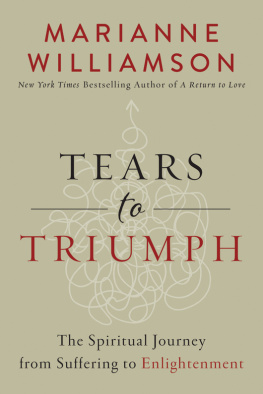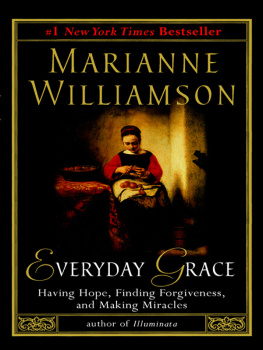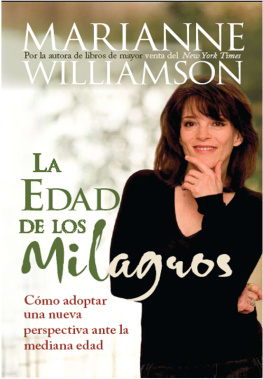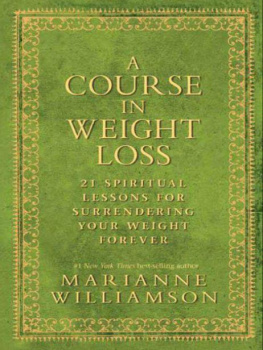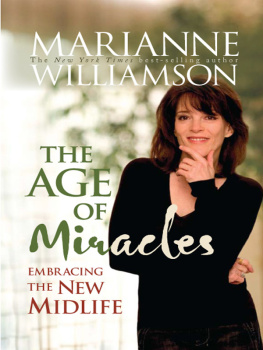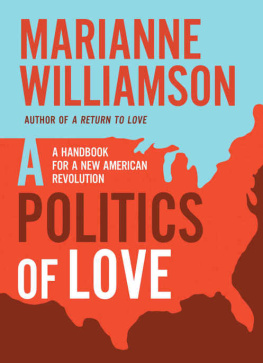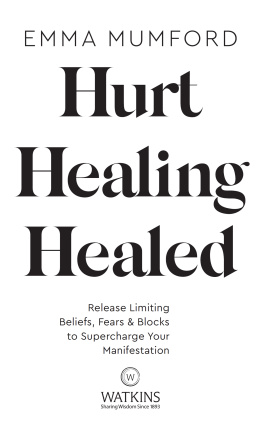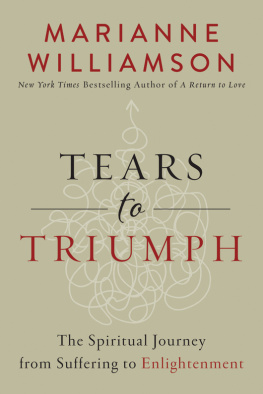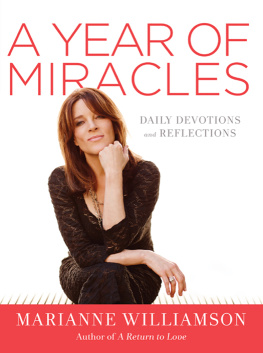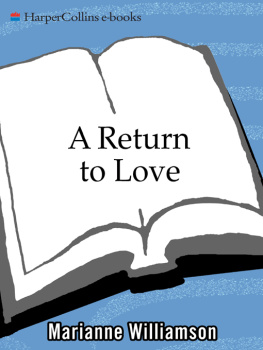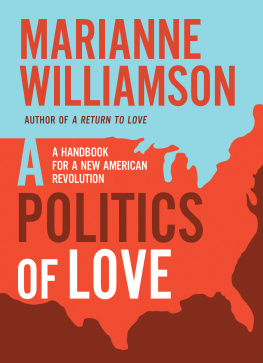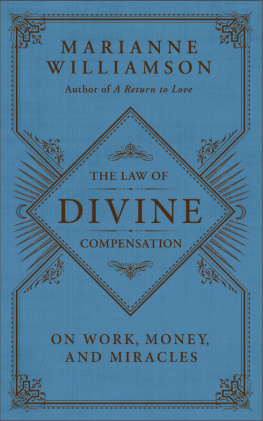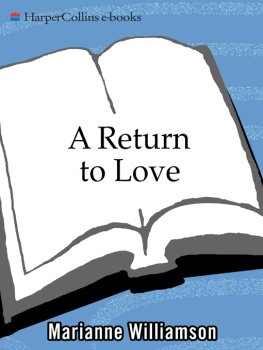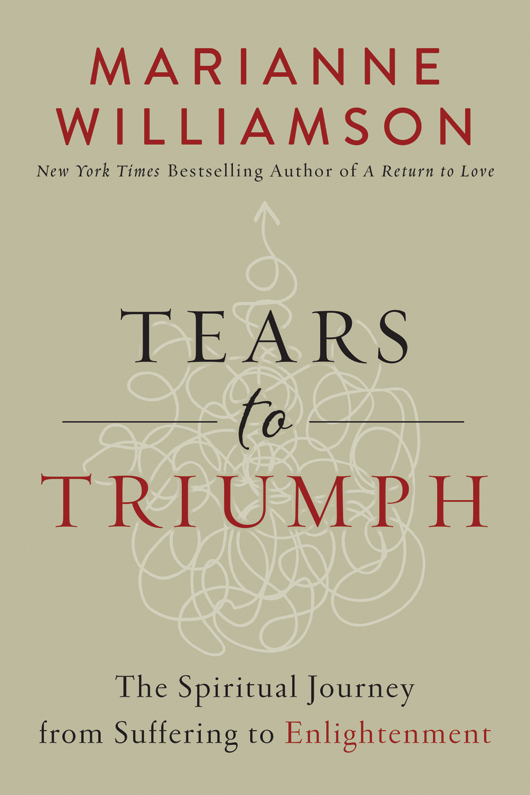F ROM THE T ENTH E LEGY, FROM R AINER M ARIA R ILKE S D UINO E LEGIES, TRANSLATION BY S TEPHEN M ITCHELL
We all face times in our lives when the pain of existence seems too much to bear. For some of us, these experiences happen rarely, and when they do, the pain is relatively mild. But for others of us, excruciating pain can weigh us down and make the slightest comfort difficult to achieve. Deeper and deeper we fall into the well of our own tears, into a darkness that seems to have no bottom. We wonder where all this suffering comes from. And we wonder whether it will ever end.
If you, or someone you love, are living through one of those timesfeeling that to take another breath, even to live another day, seems hard to contemplatethen Im glad that you are reading this book. You may find here some pieces of the puzzle you have not yet explored. A mystery. Perhaps a miracle.
This doesnt mean that you wont have to make any effort. It doesnt mean that you wont have work to do on your own behalf. Miracles arent a quick fix, or an easy answer. But they activate a spiritual power divinely authorized to help you. God is here, even here, in the midst of your suffering. And as you reach out to Him, He will reach back.
Consider the possibility now that anything could happen. Im not asking you to believe this, but only to consider that it might be true. Simply thinking this thoughtthat miracles are possibledoes more to pave the way for your healing than you can imagine. It opens the door to a realm of infinite possibilities, regardless of what you have been through or what you are going through now.
The pain you are going through is not what will determine your future; your future will be determined by who you are as you go through your pain. This is not to question the depth of your suffering. Within the mortal world, it is certainly real. But the reality in which you are ensnared is not itself what it appears to be, nor are you yourself quite the being you feel you are now. We can expand the definition of who you are, as well as what the world isand your life will begin to change. Your human self might be in hell right now, but your divine self is literally untouched by your suffering. And your divine self is who you are.
Your subconscious mind is aware of your larger reality and will assume the role of showing it to you when you are ready for it to do so. This process will be one of the great journeys of your life, as you will see things you havent seen and know things you havent known. Your tears, your hopelessness, your fear, your anger, your guilt, your resentment, your remorse, your terrornone of these will be papered over or denied. You will not dissolve them by keeping them in the dark, but by exposing them to the light. And as you do, you will see beyond them such magnificencein yourself and in the worldthat you will actually bless the journey of your suffering, for it led you to yourself and to the meaning of your life. Spiritual healing doesnt lie in denying your pain, but in feeling it fully and surrendering it to God.
And then the miracles begin...

This book is a spiritual reflection on human suffering, both its cause and its transcendence. Spirituality is not some pale-pink, gauzy, psychologically unsophisticated understanding of the world. Rather, it represents the most profound elucidation of how the mind operates and how it filters our experience. It recognizes the extraordinary depth of our most fundamental yearningour yearning for loveand the extraordinary pain that we feel when we dont find it.
There is an epidemic of depression in our world today, and a myriad of options for how to treat it. Just as there are natural remedies for disease within the body, there are natural remedies for disease within the mind. And by a natural remedy for depression I do not mean herbs or homeopathic remedies; I mean the practical application of love and forgiveness as a medicine for the soul.
As a society, we invite depression by trivializing love. We have sold our souls for a mess of pottage. Human existence is not just a random episode, with no higher purpose than that all of us should get what we want. Seen that way, with no overlay of spirit, our lives seem to have no ultimate meaning. And the soul craves meaning the way the body craves oxygen. In the absence of a spiritual framework, we know the mechanics of life but stop short of understanding it. Failing to understand life, we misuse it. And misusing it, we cause sufferingfor ourselves and for others.
Every great religious and spiritual philosophy speaks to the issue of human suffering. This book only touches the surface of the spiritual depth of insight available in the great religious and spiritual teachings of the world, but hopefully it gets to a point often obscured behind veils of dogma and misunderstanding.
For instance: Buddhas spiritual journey began when he saw suffering for the first time; Moses was moved by the suffering of the Israelites; and Jesus suffered on the cross. But the point is not simply that Buddha saw suffering; the point is that he transcended it through his enlightenment. The point is not simply that the Israelites were enslaved; the point is that they were rescued and led to the Promised Land. The point is not simply that Jesus was crucified; the point is that he was resurrected. Human suffering was only the first part of an equation; what matters most is what happened after God showed His hand.
We too are suffering and observe suffering all around us; we too are enslaved by an internal pharaoh; and we too are dying on the cross of the worlds cruelty and lack of reverence. Whether it occurred thousands of years ago or is occurring today, suffering is suffering, oppression is oppression, and cruelty is cruelty. These things are not ancient realities that dont exist anymore. Theyre not gone.
And neither is Gods power to eradicate them. Spirit enlightened Buddha; Spirit delivered the Israelites; and Spirit resurrected Jesus. If we know our suffering is the same as theirs, it makes sense to seek a deeper understanding of their deliverance, that we might more easily invoke our own. How arrogant we are, and how blind, to think that our suffering is the same as its always been, yet somehow weve improved on ways to deal with it. Are any of us under the impression that Buddha could have transcended suffering by making more money, getting a better job, or buying a better car? Or that the Israelites could have escaped slavery if theyd had another round of negotiations with Pharaoh or a private jet to take them to the Promised Land? Or that Jesus could have risen from the dead if only cryonics had been around then?

